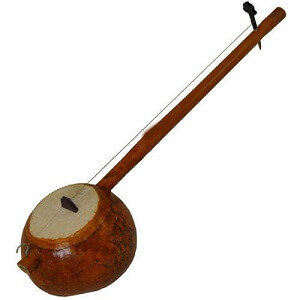Ektara
 The ektara is an instrument common to Bangladesh. The instrument has just one string, which is plucked or strummed. The different tones and notes are accomplished by pulling that one string tight and then relaxing it, creating higher and lower pitches.
The ektara is an instrument common to Bangladesh. The instrument has just one string, which is plucked or strummed. The different tones and notes are accomplished by pulling that one string tight and then relaxing it, creating higher and lower pitches.
Each ektara consists of a hollow body—usually a coconut, gourd or carved-out bit of wood—to which is attached a bamboo neck that’s divided into two pieces. As the player squeezes the pieces of neck together, the string tightens, creating higher-pitched sounds. Homemade versions start with a tin or metal can.
The Ektara is an important symbol of the folk traditions of rural Bengal, which has been made popular by the Baul and Fakiri singers, who use it as their main musical accompaniment, to spread their message of love and universal brotherhood. The word Ektara is derived from two words, Ek meaning “one” and tara meaning “string”. It is thus a one-stringed musical instrument that can produce a wide variety of tunes and melodies. The body of the Ektara is made from the shell of bottle gourd, wood apple, coconut, etc. Ektaras made from wood apple shell or coconut shell are comparatively smaller in size compared to those made from bottle gourd shell. The bowl of the instrument is covered with skin and fixed to a prepared bamboo, approximately three feet long. The string, usually made of steel, is attached to the bottom of the bowl, and to a wooden knob at the other end, called the Kaan (ear). The Ektara is usually held in the right hand, and played with the right forefinger.